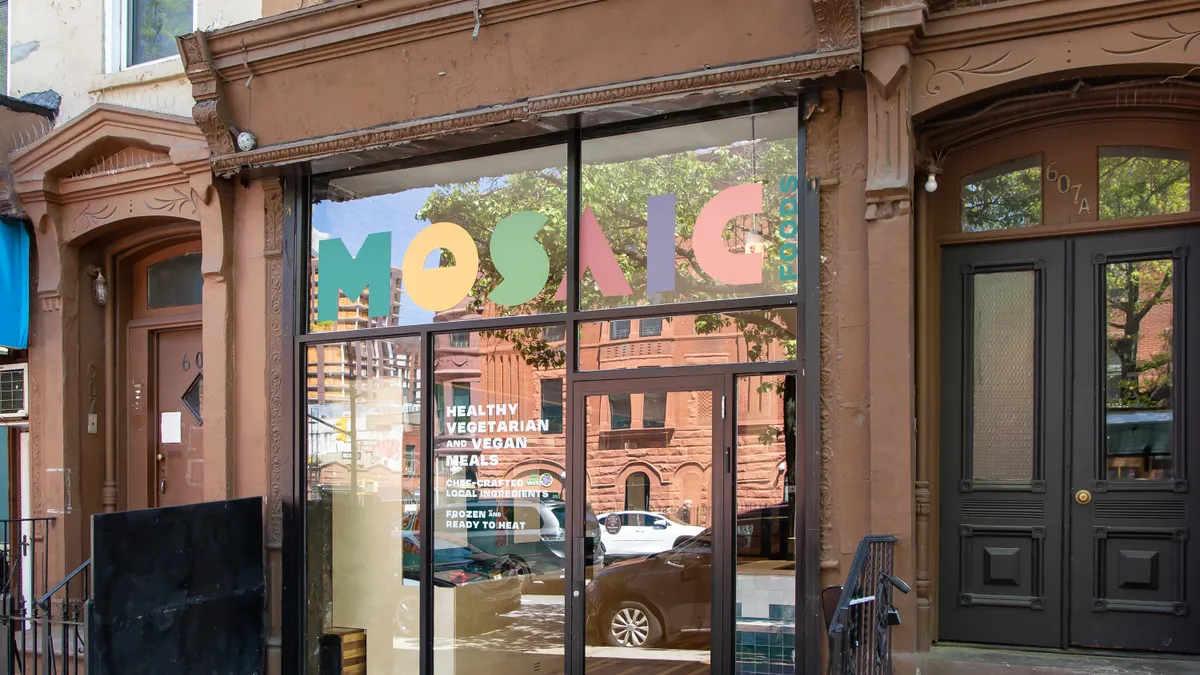Direct-to-consumer brand Mosaic wants to debunk frozen food's bad reputation among U.S. consumers while also driving brand awareness. To accomplish both tasks, it's taking inspiration from Europe and opening its first frozen-only grocery store.
On Friday, the maker of plant-based, frozen meals is opening a brick-and-mortar pop-up in Brooklyn's Prospect Heights neighborhood. The store, which will be open for at least six months, will feature all of Mosaic’s online assortment and its Mosaic+ collection of chef-created meals, along with soon-to-launch categories and ones the brand wants to test, Sam McIntire, co-founder and chief revenue officer, said in an interview
McIntire said the inspiration for the pop-up came from frozen-focused retail brands abroad, especially in Europe, like French food company Picard Surgelés and U.K. supermarket chain Iceland Foods.
“It's a model that's really popular in the rest of the world and it hasn't really caught on in the U.S. yet, partially because the frozen industry is so stigmatized,” McIntire said.
Mosaic, at the intersection of plant-based and frozen foods, hopes the store can help change the common perception that “frozen meal” equates with TV dinners of the ‘50s and ‘60s. This comes as the broader frozen food industry has focused on improving flavor and freshness over the past few years, and with sales rising even before the pandemic as a result.
The store comes on the heels of a $6 million seed round in November led by Gather Ventures, which the Brooklyn-based food startup plans to use to scale its DTC business, expand into offline channels and roll out new product lines.
Breaking down barriers
Founded by McIntire and Matthew Davis, who met while working at consulting firm Bain & Company, Mosaic launched in May 2019 with a mission to reach health-minded consumers with flash-frozen, vegetable-packed meals.
Now celebrating its three-year anniversary, the food startup is turning to brick-and-mortar to help it overcome several obstacles to winning customers, from stereotypes about frozen products to customer wariness about the taste and quality of online-only offerings. The brand's website notes that freezing food can preserve nutrients and reduce food waste by extending the shelf life of meals.
The store will offer sampling events to let shoppers try items after they've been fully heated. It will also help with the challenges of being an online-only brand, McIntire said, since customers won't have to meet the $70 order minimum and sign up for recurring meal deliveries.
On the sustainability front, Mosaic is grappling with how to make its operations more eco-friendly. In November, the brand unveiled updated packaging, including a paper-based liner that's fully curbside recyclable.
"We do a lot and we spend a lot to make sure that our deliveries are as sustainable as possible ... but even with all those things that we're doing, it's still less packaging and less waste if we can bring the meal directly to the person without the dry ice, without the liner, without the cost of the shipment and the carbon emissions involved in that process," McIntire said.
To help keep the retail operations sustainable, Mosaic is primarily using chest freezers for its products, along with some standing freezers. "Cold air falls, so when you have a chest freezer and you're opening the door from the top, the cold air is sitting in that freezer and not rising out of it," McIntire said.
Inside the store
Located at 607a Vanderbilt Ave., the store is about 700 square feet, with roughly a third of the space reserved for a "sampling bar" that will be serving up items multiple times throughout each day. The sales floor will have more than 70 SKUs of vegetarian and vegan meals.
The store will serve as the launch point for new categories before they become available online, including pizzas and smoothies. Shoppers will be able to get 16 oz. smoothies ($7.99 or three for $20) in flavors like carrot spice, mango lassi and cacao cold brew before they launch online in June. The pizza category, which Mosaic said is the most requested item by its customers, will include BBQ seitan, “sausage” and peppers, four cheese and broccoli crust. The pizzas will become available for online customers in July.
Mosaic will have some in-store-only offerings, including cookies in flavors like snickerdoodle and double chocolate, and sides meant to be paired with its four-serving family meals. The sides available will include roasted potatoes, braised coconut spinach, harissa glazed carrots and balsamic sprouts and carrots.
“It's a very unique opportunity for us to have people try the product in front of us in our space and sit down with them and say, ‘Hey, is this something you like? How would you tweak it? Are the flavors right? Is it the kind of food that you want to eat on a regular basis?’” McIntire said. “And then we can take those learnings and bring them to our direct-to-consumer side.”
Being able to offer in-person sampling while also driving brand awareness has spurred suppliers to open brick-and-mortar stores over the past several years. In grocery, these have mainly been one-off openings, like a Jack Links store that opened in Minneapolis and Blue Apron pop-up stores that rolled out over a monthlong period in New York City in 2018. Brands that began online, like Warby Parker and Allbirds, have opened stores in major cities as they look to reach more consumers.
As omnichannel shopping grows, companies are also exploring a variety of digital selling channels. Major suppliers like PepsiCo and Impossible Foods have debuted direct-to-consumer selling sites, while online brands Butcherbox and SunBasket recently started selling their products on Instacart.








